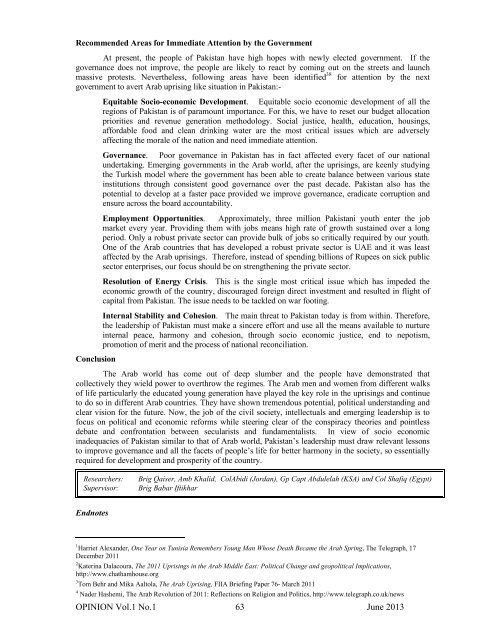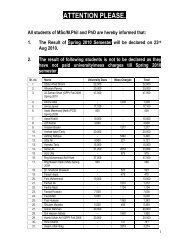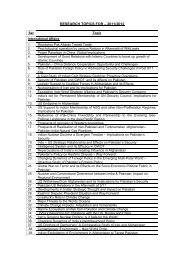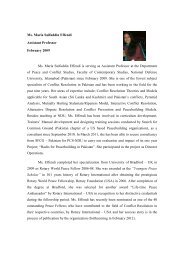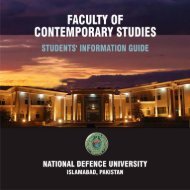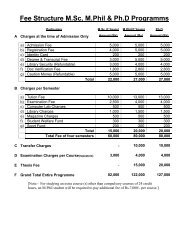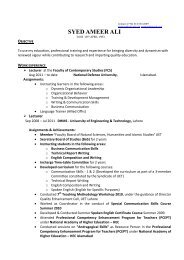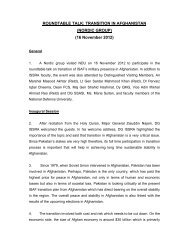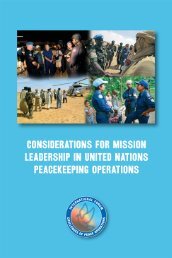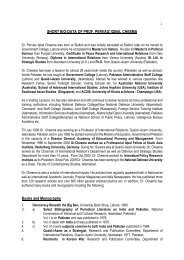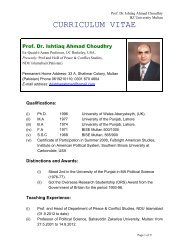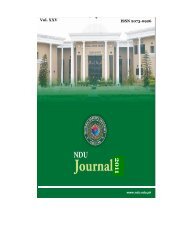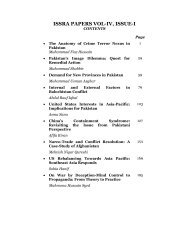OPINION Vol.1, No.1 June 2013 - National Defence University
OPINION Vol.1, No.1 June 2013 - National Defence University
OPINION Vol.1, No.1 June 2013 - National Defence University
Create successful ePaper yourself
Turn your PDF publications into a flip-book with our unique Google optimized e-Paper software.
Recommended Areas for Immediate Attention by the Government<br />
At present, the people of Pakistan have high hopes with newly elected government. If the<br />
governance does not improve, the people are likely to react by coming out on the streets and launch<br />
massive protests. Nevertheless, following areas have been identified 38 for attention by the next<br />
government to avert Arab uprising like situation in Pakistan:-<br />
Conclusion<br />
Equitable Socio-economic Development. Equitable socio economic development of all the<br />
regions of Pakistan is of paramount importance. For this, we have to reset our budget allocation<br />
priorities and revenue generation methodology. Social justice, health, education, housings,<br />
affordable food and clean drinking water are the most critical issues which are adversely<br />
affecting the morale of the nation and need immediate attention.<br />
Governance. Poor governance in Pakistan has in fact affected every facet of our national<br />
undertaking. Emerging governments in the Arab world, after the uprisings, are keenly studying<br />
the Turkish model where the government has been able to create balance between various state<br />
institutions through consistent good governance over the past decade. Pakistan also has the<br />
potential to develop at a faster pace provided we improve governance, eradicate corruption and<br />
ensure across the board accountability.<br />
Employment Opportunities. Approximately, three million Pakistani youth enter the job<br />
market every year. Providing them with jobs means high rate of growth sustained over a long<br />
period. Only a robust private sector can provide bulk of jobs so critically required by our youth.<br />
One of the Arab countries that has developed a robust private sector is UAE and it was least<br />
affected by the Arab uprisings. Therefore, instead of spending billions of Rupees on sick public<br />
sector enterprises, our focus should be on strengthening the private sector.<br />
Resolution of Energy Crisis. This is the single most critical issue which has impeded the<br />
economic growth of the country, discouraged foreign direct investment and resulted in flight of<br />
capital from Pakistan. The issue needs to be tackled on war footing.<br />
Internal Stability and Cohesion. The main threat to Pakistan today is from within. Therefore,<br />
the leadership of Pakistan must make a sincere effort and use all the means available to nurture<br />
internal peace, harmony and cohesion, through socio economic justice, end to nepotism,<br />
promotion of merit and the process of national reconciliation.<br />
The Arab world has come out of deep slumber and the people have demonstrated that<br />
collectively they wield power to overthrow the regimes. The Arab men and women from different walks<br />
of life particularly the educated young generation have played the key role in the uprisings and continue<br />
to do so in different Arab countries. They have shown tremendous potential, political understanding and<br />
clear vision for the future. Now, the job of the civil society, intellectuals and emerging leadership is to<br />
focus on political and economic reforms while steering clear of the conspiracy theories and pointless<br />
debate and confrontation between secularists and fundamentalists. In view of socio economic<br />
inadequacies of Pakistan similar to that of Arab world, Pakistan’s leadership must draw relevant lessons<br />
to improve governance and all the facets of people’s life for better harmony in the society, so essentially<br />
required for development and prosperity of the country.<br />
Researchers:<br />
Supervisor:<br />
Brig Qaiser, Amb Khalid, ColAbidi (Jordan), Gp Capt Abdulelah (KSA) and Col Shafiq (Egypt)<br />
Brig Babar Iftikhar<br />
Endnotes<br />
1 Harriet Alexander, One Year on Tunisia Remembers Young Man Whose Death Became the Arab Spring, The Telegraph, 17<br />
December 2011<br />
2 Katerina Dalacoura, The 2011 Uprisings in the Arab Middle East: Political Change and geopolitical Implications,<br />
http://www.chathamhouse.org<br />
3 Tom Behr and Mika Aaltola, The Arab Uprising, FIIA Briefing Paper 76- March 2011<br />
4 Nader Hashemi, The Arab Revolution of 2011: Reflections on Religion and Politics, http://www.telegraph.co.uk/news<br />
<strong>OPINION</strong> <strong>Vol.1</strong> <strong>No.1</strong> 63 <strong>June</strong> <strong>2013</strong>


